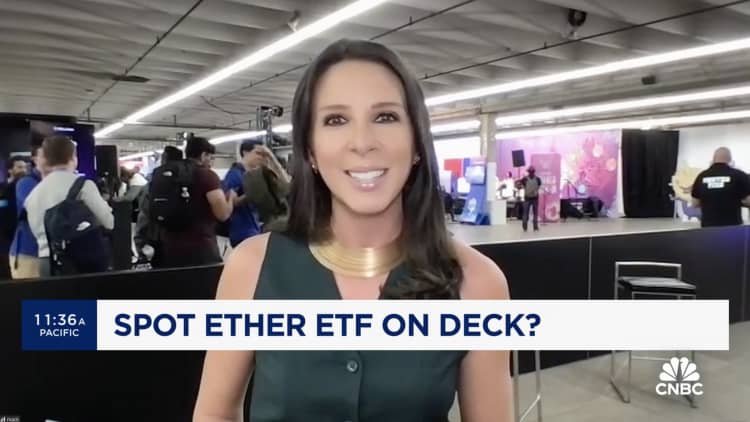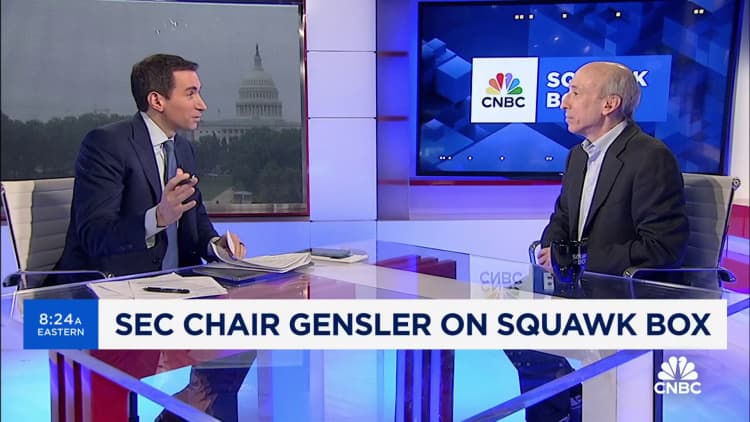For years, the SEC has cracked down heavily on the cryptocurrency sector, but in the past few months, the agency appears to have turned its sights on… Ethereum, especially. Some of the biggest names in DeFi are now fighting back.
In a 40-page filing on Tuesday, Uniswap Labs — which builds decentralized financial infrastructure including a popular DeFi cryptocurrency exchange that enables users to hold their coins — detailed to the SEC all the reasons why the agency should not take… Legal action against them. This comes just weeks after the Commission issued a Wells Notice to Uniswap, warning the company that it had identified potential violations of US securities law.
“The entire SEC case is based on the false assumption that all tokens are securities. Tokens are, in fact, just a file format for value,” said Marvin Amore, chief legal officer at Uniswap.
“The SEC has to fundamentally change the definitions of stock exchange, brokerage and investment contracts unilaterally in order to try to control what we do,” Amory said.
The Wells notice is usually one of the final steps before the SEC officially issues the charge. It generally sets out the framework of a regulatory argument and provides potential defendants with an opportunity to refute the SEC's allegations.
So far this year, the federal regulator has sent Wells Notices, filed lawsuits, or reached settlements with a range of cryptocurrency companies, and the SEC's legal challenges are increasingly focusing on Ethereum and DeFi players, including ShapeShift, TradeStation, Uniswap and ConsenSys. It also comes as the agency is said to be investigating the Ethereum Foundation.
CNBC reached out to the SEC regarding the latest batch of Wells notices sent to cryptocurrency companies, and a spokesperson for the agency declined to comment.
In April, Consensys attempted to preempt action by the SEC with its own lawsuit, alleging wrongdoing by the regulator. The 10-year-old cryptocurrency company said its lawsuit follows three subpoenas issued last year, as well as a Wells notice from the Securities and Exchange Commission that claimed the company was violating federal securities laws.
“This action is almost certain that we believe the SEC is trying to slow down or eliminate Ethereum, decentralization, disintermediation, and disintermediary technology in the United States, and it probably won't stop there with its long arm,” the Ethereum longtime veteran said. Veteran Joseph Lubin, who went from co-founding blockchain to launching and running Consensys.
“This may influence other nation-states to do similarly drastic things,” Lubin continued.
Security versus commodity
The latest wave of actions targeting major names operating in the Ethereum ecosystem comes ahead of the long-awaited decision on whether the regulator will approve or deny requests to launch Ethereum spot exchange-traded funds.
So far, the agency's position on classifying ether as a commodity or security remains uncertain.
“We think the big banks like the way things are structured. We think some factions in the U.S. government like the way they operate,” Lubin said. “Without explicitly stating their intentions, and without public discussion and clear rulemaking, the SEC appears to have decided to reclassify ether as a security without being able to verbalize that this is what they are doing.”
The industry argues that if ether – the native token of the Ethereum blockchain – is classified as a security, it could call into question the future of the Ethereum network and many neighboring cryptocurrency companies. Exchanges, both centralized and decentralized, will be forced to choose between registering with the SEC, or delisting ether altogether.
“If the SEC were to, in fact, take the position that Ethereum is a security, almost everyone in this business is using or providing blockchain services for Ethereum, they would be put on notice that they might need to register,” said digital asset attorney Christopher Gerrold, who previously served as Ethereum. Position of Chief Securities Officer in New Jersey.
“Whatever protections they thought they had before will no longer exist, and we will see a shift in the industry,” Gerrold continued.


Consensys' head of litigation and investigations told CNBC that the company is concerned about the SEC targeting developers.
“They requested a list of names of all Consensys developers who contributed to any development for the merger,” Laura Brookover said.
The so-called merger was a years-long system-wide upgrade to the Ethereum blockchain that took effect in September 2022 and changed the way transactions are verified. The Proof-of-Stake model, which replaced the Proof-of-Work model, requires volunteers on the network to stake their ether tokens, or “stakes,” in order to secure the network.
The agency explicitly asked for the identities of public and private Consensys software developer code repositories, Brookover says.
“These are very strange requests from a financial regulator,” Brookover continued. “I can talk about that, because I used to be in the enforcement division of the CFTC and investigated the cases myself.”
Several programmers and industry executives told CNBC that it's possible the SEC could take more interest in Ethereum, because the regulator believes its native token acts more like a security after the merger.
Brookover told CNBC that the Consensys lawsuit asks the court to declare that ether is not a security and that the SEC lacks jurisdiction to investigate ethereum. Ultimately, the regulator will have to respond to Consensys' complaint in a legal filing.
“It would be difficult for them not to say in their answer whether they believe ethereum is a security or not,” Gerrold said, adding that he doubted the agency would take the position that it is a security because of the evidence. The quota change that took effect two years ago.
One thing the SEC was clear about was classifying Bitcoin as a commodity. With ether, the narrative changed.
In 2018, when Bill Hinman was still director of the SEC's Division of Corporate Finance, he told CNBC: “When we look at bitcoin or if we look at ether and the highly decentralized nature of networks, we don't see a third-party promoter where the application of a system is Disclosure makes a lot of sense.”
“So we are comfortable… and view these items as items that do not need to be regulated as securities,” Hinman continued.
In April 2023, when Rep. Patrick McHenry, R-North Carolina, asked SEC Chairman Gary Gensler whether ether was a commodity or a security, Gensler demurred.


SEC vs. Crypto
Gensler, in multiple interviews, has repeatedly expressed his belief that much of the industry already belongs under its purview, and that its lawsuits simply bring the industry into compliance. Cryptocurrency companies argue that recent legal battles have not provided the regulatory clarity the industry has been seeking for years.
With the Uniswap Wells notice, for example, a company source told CNBC that dealing with the SEC was akin to “talking to a wall.”
For two years before Wells' notice, Uniswap described lengthy interactions with the agency as an opaque process that included responding to multiple requests, including providing testimony and sending numerous documents to the agency, without getting much feedback about the regulator's concerns about potential wrongdoing. This source also told CNBC that they had not heard from the regulator at all in 2024 until the agency told them in a half-hour phone call that they would receive a formal notification.


Both Consensys and Uniswap point out that the SEC's broad approach to classifying securities may be outdated.
“The SEC argues that the Uniswap protocol is an unregistered securities exchange, and that the Uniswap interface and wallet are both unregistered broker-dealers,” Amore said.
But Uniswap says the protocol itself is a general-purpose computer program that anyone can use and integrate.
“So the protocol is not an exchange either, because by law, it should be specifically designed for securities trading, which it is not,” Amore continued.
Uniswap argues in its response to the SEC that the majority of its trading volume is clear securities, such as ethereum, bitcoin, and stablecoins.
“It is not run by a group, as the definition requires, but as an independent program not controlled by a person or group,” Amore added.
“The SEC knows that the current definition of an exchange doesn't cover protocol, or anything that we do. And that's why, as we speak right now, there's a pending rulemaking process, where the SEC is trying to redefine about a half-dozen words in its own regulations to try to catch us “, Uniswap's chief legal officer continued.
Alma Angotti, partner and head of global legislative and regulatory risk at advisory firm Guidehouse, warns that it is unclear whether decentralized exchanges function as an alternative trading system, or a market maker – or whether they are really just a technology that does not work. As a broker-dealer.
Meanwhile, as the SEC increases its focus on decentralized players in the cryptocurrency ecosystem, centralized players also remain under scrutiny by the regulator.
In May, the investment platform Robin Hood It announced that it had received notice from Wells regarding the company's crypto operations. The SEC also filed a lawsuit against Coinbase and Binance. With several legal challenges pending from the regulator and continued uncertainty about the future of cryptocurrency regulation in the United States, several cryptocurrency companies have said they are considering exiting the country altogether.
“We have companies wasting resources trying to figure out, ‘Am I a broker-dealer? Are these assets securities?’” said Christina Rea, former chief compliance officer at Binance.
“We're already having a hard enough time trying to get them to comply with other important laws — anti-money laundering laws, anti-bribery and anti-corruption laws.”
On Thursday, the committee will issue a decision on whether to approve one of the Ethereum ETF applications after a delay of several months. Many are waiting to know whether the regulatory body will clarify its position on ether.
— CNBC's Jordan Smith contributed to this report.


